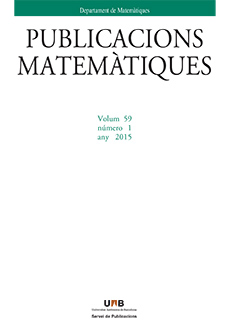Abstract
For an integrable function $f$ on $[0,1)^d$, let $S(f)$ and $Mf$ denote the corresponding dyadic square function and the dyadic maximal function of $f$, respectively. The paper contains the proofs of the following statements.
(i) If $w$ is a dyadic $A_1$ weight on $[0,1)^d$, then $$ ||S(f)||_{L^1(w)}\leq \sqrt{5}[w]_{A_1}^{1/2}||Mf||_{L^1(w)}. $$ The exponent $1/2$ is shown to be the best possible.
(ii) For any $p>1$, there are no constants $c_p$, $\alpha_p$ depending only on $p$ such that for all dyadic $A_p$ weights $w$ on $[0,1)^d$, $$ ||S(f)||_{L^1(w)}\leq c_p[w]_{A_p}^{\alpha_p}||Mf||_{L^1(w)}. $$
Citation
Adam Osȩkowski. "Weighted square function inequalities." Publ. Mat. 62 (1) 75 - 94, 2018. https://doi.org/10.5565/PUBLMAT6211804
Information





